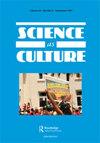从邪恶的半冲动到关爱英雄:电影中的遗传学家形象
IF 2.4
3区 哲学
Q1 CULTURAL STUDIES
引用次数: 0
摘要
尽管大众文化中描绘的科学和科学家形象被批评为夸大和制造恐惧,但电影是影响个人科学信仰的重要资源。因为大众对科学的描述在构建公众的“科学想象”中起着至关重要的作用,它们构成了社会对科学理解的一个固有维度,对于科学传播与“真实”科学一样重要。145部电影中对遗传学家的虚构描述表明,流行文化(重新)构建了科学家的共同形象和刻板印象。虽然电影中最普遍的负面刻板印象包括:邪恶的造物主,没有道德的利己主义者,书呆子遗传学家和背叛科学精神的资本家,但在过去的几十年里,电影倾向于构建更积极的遗传学家形象:客观的研究者,实用的专家,生物伦理学家,有爱心的医生和专注的理想主义者。此外,尽管电影中描述的分子生物学主要代表了一个男人的世界,尤其是自20世纪90年代以来,女性遗传学家的形象正在上升。遗传学家在电影中的多重表现表明,遗传学家的电影形象构成了一个重要的叙事工具,帮助电影制作人重建与生物技术有关的社会承诺和危险。因此,电影应该被理解为一个检验流行文化如何激发与渗透文化的科学革命相关的希望和焦虑的场所,以及这些希望和恐惧如何随着时间的推移从恐怖到希望,从虚构到现实。本文章由计算机程序翻译,如有差异,请以英文原文为准。
From evil demiurge to caring hero: images of geneticists in the movies
ABSTRACT Although images of science and scientists depicted in popular culture have been criticized as an exaggeration and fear mongering, the cinema is an important resource that influences individuals’ beliefs about science. Because popular depictions of science play a crucial role in constructing the public’s ‘scientific imaginary’ they constitute an inherent dimension of the social understanding of science and are as important for science communication as the ‘real’ science. Fictional filmic representations of geneticists portrayed in 145 films reveal that popular culture (re)constructs common images and stereotypes of scientists. While the most prevalent negative stereotypes depicted in films include: the evil demiurge, the egoist without morals, the nerdy geneticist, and the capitalist who betrays the ethos of science, over the last few decades films tend to construct more positive images of geneticists: the objective researcher, the practical expert, the bioethicist, the caring physician and the dedicated idealist. Additionally, although molecular biology depicted in films largely represents a man’s world, especially since the 1990s, the figure of the woman geneticist is on the rise. The coexistence of multiple representations of geneticists in films demonstrate that cinematic images of geneticists constitute an important narrative tool that helps moviemakers in reconstructing the social promises and perils related to biotechnology. Thus, films should be understood as a site for the examination of how popular culture fuels hopes and anxieties related to the scientific revolution that permeate culture and how these hopes and fears change over time from horror to hope and from fiction to reality.
求助全文
通过发布文献求助,成功后即可免费获取论文全文。
去求助
来源期刊

Science As Culture
Multiple-
CiteScore
5.20
自引率
3.80%
发文量
28
期刊介绍:
Our culture is a scientific one, defining what is natural and what is rational. Its values can be seen in what are sought out as facts and made as artefacts, what are designed as processes and products, and what are forged as weapons and filmed as wonders. In our daily experience, power is exercised through expertise, e.g. in science, technology and medicine. Science as Culture explores how all these shape the values which contend for influence over the wider society. Science mediates our cultural experience. It increasingly defines what it is to be a person, through genetics, medicine and information technology. Its values get embodied and naturalized in concepts, techniques, research priorities, gadgets and advertising. Many films, artworks and novels express popular concerns about these developments. In a society where icons of progress are drawn from science, technology and medicine, they are either celebrated or demonised. Often their progress is feared as ’unnatural’, while their critics are labelled ’irrational’. Public concerns are rebuffed by ostensibly value-neutral experts and positivist polemics. Yet the culture of science is open to study like any other culture. Cultural studies analyses the role of expertise throughout society. Many journals address the history, philosophy and social studies of science, its popularisation, and the public understanding of society.
 求助内容:
求助内容: 应助结果提醒方式:
应助结果提醒方式:


